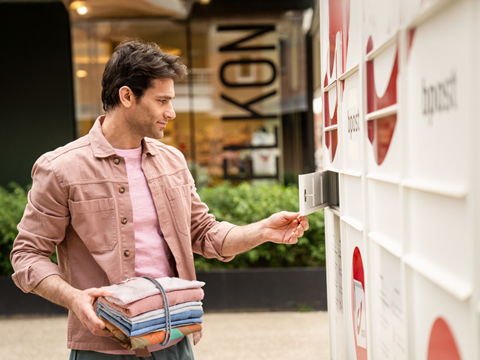
A pilot project run by bpost allows customers to post items without packaging or labels by delivering them to and collecting them from lockers accessed via smartphone.
Claiming to be the first shipping service of its kind, bpost now enables private customers and businesses in the Antwerp region to send items between lockers without being packaged or labelled.
To ship an item, senders are instructed to generate a digital shipping label; this service is currently available through the My bpost app, but will eventually be accessible via the website.
Each label comes with a barcode, which can be scanned with a smartphone to open a Parcel locker. An unwrapped, unlabelled item with a maximum size of 48 x 32 x 20 cm can be placed within the locker and monitored in transit via Track & Trace.
From here, the item will be delivered to a Parcel locker chosen by the recipient or closest to their address. They will receive an email or My bpost app notification when the delivery arrives, at which point they can use their smartphone to access the locker and collect their post.
This process is expected to maximize customer convenience by negating the need for cardboard boxes, adhesive tape, or label printing. bpost hopes that packaging-free deliveries will correspond with increasing interest in the circular economy, especially with the growing popularity of secondhand marketplaces like Vinted.
It is also set to become the cheapest postal option available to Belgian customers, with items weighing up to two kilograms costing €3.99 to deliver.
Over 1,260 Parcel lockers are currently available across Belgium, with more than thirty located in Antwerp and its surrounding areas. Having achieved a 40% growth in 2024, the company now plans to reach 2,500 lockers in 2025 and handle 150,000 parcels simultaneously.
A similar solution was revealed by no-boxx in 2023. Although consumers are provided with a reusable rPET pouch, consumers could opt to receive a QR code and drop off items or packs at 24/7 InPost Lockers – a method hoped to streamline the returns process.
The solution comes with a proprietary web application to track deliveries and returns, track the packaging’s life cycle, and visualize the environmental impact of their switch to a reusable pack.
A wave of packaging-free shopping solutions have also hit supermarkets in recent years. In one example, Aldi held a refill trial in which basmati rice, brown rice, penne pasta, and wholewheat fusilli were available for consumers to buy loose and transport in their own containers.
This later expanded into a pilot for an in-store refill system offering key food staples like pasta, grains, and cereals, which was subsequently nominated for a Sustainability Award. Such solutions are expected to cut down on single-use plastics and, in turn, lower product prices.
In other news, the Royal Mail postal system plans to cut CO2 emissions by 84% compared to single-use packaging by adopting Movopack’s returnable packaging solution. Consumers are encouraged to return their reusable packs to any of the 115,000 postboxes across the UK in what is described as a more cost-effective solution than conventional, single-use postal packaging.
If you liked this story, you might also enjoy:
The ultimate guide to the Packaging and Packaging Waste Regulation in 2024
How are the top brands progressing on packaging sustainability?
Sustainable Innovation Report 2024: Current trends and future priorities
Everything you need to know about global plastic sustainability regulation














No comments yet